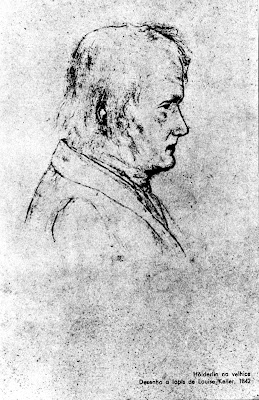Once Upon an Autumn ...
Corona
Autumn eats its leaf out of my hand: we are friends.
From the nuts we shell time and we teach it to walk:
then time returns to the shell.
In the mirror it’s Sunday,
in dream there is room for sleeping,
our mouths speak the truth.
My eye moves down to the sex of my loved one:
we look at each other,
we exchange dark words,
we love each other like poppy and recollection,
we sleep like wine in the conches,
like the sea in the moon’s blood ray.
We stand by the window embracing, and people
look up from the street:
it is time they knew!
It is time the stone made an effort to flower,
time unrest had a beating heart.
It is time it were time.
It is time.
Paul Celan
Translated by Michael Hamburger
Corona
Autumn nibbles its leaf from my hand: we are friends.
We shell time from the nuts and teach it to walk:
time returns into its shell.
In the mirror is Sunday,
in dream comes sleeping,
the mouth speaks true.
My eye goes down to my lover's loins:
we gaze at each other,
we speak dark things,
we love one another like poppy and memory,
we slumbeer like wine in the seashel,
like lthe sea in the moon's blood jet.
We stand at the window embracing, they watch from the street:
it’s time people knew!
It’s time the stone consented to bloom,
a heart beat for the unrest.
It's time it came time.
It is time.
Translated by John Felstiner, Selected Poems and Prose of Paul Celan, (New york, W.W.Norton, 2001), p.29.
A really interesting post about:
Translating Paul Celan
[...]
“Corona” is a poem worth examining because Celan borrows from Rilke’s poem “Autumn Day” by making extreme and quiet changes.
Rilke’s “Autumn Day” translated by Edward Snow
Autumn Day
Lord: it is time. The summer was immense.
Lay your long shadows on the sundials,
and on the meadows let the winds go free.
Command the last fruits to be full;
give them just two more southern days,
urge them on to completion and chase
the last sweetness into the heavy wine.
Who has no house now, will never build one.
Who is alone now, will long remain so,
will stay awake, read, write long letters
and will wander restlessly up and down
the tree-lines streets, when the leaves are drifting.
Hamburger’s translation of the first lines of “Corona”;
“Autumn eats its leaf out of my hand: we are friends.
From the nuts we shell time and we teach it to walk:
then time returns to the shell.”
In the mirror it’s Sunday,
in dream there is room for sleeping,
our mouths speak the truth.” (61)
And Felstiner’s version:
“Autumn nibbles its leaf from my hand: we are friends.
We shell time from the nuts and teach it to walk:
time returns into its shell.
In the mirror is Sunday,
in dream comes sleeping,
the mouth speaks the truth.” (29)
The first stanza is similar while the second is not. Hamburger’s translation says “our,” while Felstiner’s uses “the.” I would argue that Celan meant the universal not the singular, thus, Hamburger’s translation works better. Also in dream there is room for sleeping connotes our place to escape. While in dream comes sleeping presents the idea that sleeping approaches the singular. The idea of the time returning to it’s shell could be seen as summer turning into autumn; life into death. Summer reflects growth whereas autumn refers to harvesting which means (death).
Hamburger’s translation of the ending of “Corona:”
“We stand by the window embracing, and people look up from
the street:
it is time they knew!
It is time the stone made an effort to flower,
time unrest had a beating heart.
It is time it were time.
It is time.”
And Felstiner’s version:
“We stand at the window embracing, they watch from the street:
it’s time people knew!
It’s time the stone consented to bloom,
a heart beat for the unrest.
It time it came time.
It is time.”
The words effort and consent again imply different meaning. Effort gives forth the idea of application and accomplishment, while consent means give permission to. Hamburger, therefore is saying that the collective our, is working toward, while Felstiner’s version gives forth the notion that we are acquiescing.
I would argue with those that say his work is hermetic because his poetry though difficult and seemingly written for himself, I see it as written for humankind. That is what makes him a unique, powerful and influential writer. He writes for the dead who have no voice, he writes of the horror of the death camps, he writes about a universal experience. His, is poetry of witness. [...]


Comentários